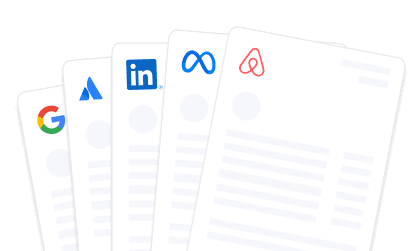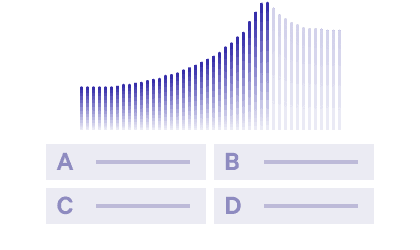The 10 Most Common Product Management (PM) Behavioral Interview Questions
Discover the 10 most common PM behavioral interview questions and learn how to prepare with clear, practical examples to stand out in your product manager interview.
Posted September 9, 2025

Join a free event
Learn from top coaches and industry experts in live, interactive sessions you can join for free.
Table of Contents
Behavioral interviews are important in the product manager interview process. They help hiring managers assess how candidates handle real-world problem-solving, leadership, and teamwork challenges. By focusing on specific examples from a candidate’s past experiences, behavioral interviews reveal key skills that go beyond what’s listed on a resume.
Read: What is Product Management?
What Are Behavioral Interviews?
Behavioral interviews are a way for companies to see how you’ve handled situations in your previous jobs. Instead of asking about what you might do in a situation, they want to hear about what you’ve actually done before. This helps employers understand your skills, how you think, and the decisions you’ve made in real-life scenarios. In product management jobs, companies use these interviews to see if you can lead and make decisions, even when you don’t have all the information or are working under pressure. They also want to know if you can communicate clearly, like explaining tricky ideas to people who don’t know the technical details, or working well with other teams to reach the same goals. It’s important to show that you can solve problems creatively, especially when facing challenges like not having enough resources or dealing with unhappy customers. These skills are key for product managers, as they often need to solve big challenges, like handling negative feedback or leading teams to create products that users love.
Behavioral interview questions are just one part of the interview process for a product manager role. There may also be technical questions or discussions about product strategies. To do well, it helps to prepare answers ahead of time, using a simple method like STAR (Situation, Task, Action, Result) to explain your answers clearly. These interviews focus on demonstrating how you apply your knowledge in practice, rather than just what you know.
Read: How to Get Into Product Management (An Expert's Perspective)
Common PM Behavioral Interview Questions
1. Describe a Time You Solved a User Pain Point
This question is asked to see how well you can understand and address problems that users face with a product. The company wants to know if you can gather and analyze user feedback, identify problems, and come up with solutions.
Sample Answer:
"A few months ago, users were struggling to navigate a new feature in our app. They gave feedback that it was hard to find what they needed, so I gathered insights from surveys and user data. After identifying the issues, I worked with the design team to simplify the layout and make labels clearer. The result? Users were able to find information faster, and we received positive feedback. This change helped improve the product's success by better meeting customer needs."
Note: When answering this question, use the STAR (Situation, Task, Action, and Result) Method. First, talk about the situation you were in, then explain the task you needed to complete. Next, describe the actions you took to solve the problem, and finally, share the result of your efforts. Be sure to focus on the specific problem, the steps you took to fix it, and the positive outcome that came from your solution.
2. How Have You Handled Negative User Feedback?
Your ability to collaborate effectively across technical teams, marketing, design, and other stakeholders is often assessed through this type of interview question.
Sample Answer:
"When we got negative feedback about a feature being confusing, I made sure to listen carefully. I asked users for more details to understand the issue better. Then, I worked with the design and development teams to simplify the feature and make it easier to use. After making the changes, we tested it with users, and the feedback was much better. By listening and taking action, we turned the negative feedback into a chance to improve the product."\
Note: Highlight communication and leadership skills, focusing on how you navigated challenges or competing priorities.
3. Share an Example of Working with Cross-Functional Teams
In this type of question, recruiters want to know how well you can collaborate, communicate, and coordinate with different teams to achieve a common goal.
Sample Answer:
"In a previous project, we were launching a new feature, and I worked with design, engineering, and marketing teams. I made sure everyone was on the same page by keeping communication open between teams. For example, I worked with design to ensure the feature was technically feasible with engineering, while also making sure marketing understood the key benefits for users. By keeping everyone aligned, we were able to launch the feature successfully and on time."
4. Tell Me About a Time You Launched a Product Successfully
Your understanding of product strategy, leadership abilities, and ability to measure success.
Sample Answer:
"I oversaw the launch of a mobile app feature aimed at improving user engagement. Through careful user research and collaboration with technical teams, we introduced the feature on schedule. Post-launch metrics showed a 15% increase in user retention."
Note: Emphasize the importance of using structured frameworks to effectively answer these questions and convey organized thinking and problem-solving abilities throughout the PM interview process.
5. How Do You Address Technical Constraints in a Project?
Here, your technical knowledge and problem-solving skills in balancing constraints with business and user needs.
Sample Answer:
"During a product strategy meeting, a proposed feature faced significant technical limitations. I collaborated with technical product managers to redefine the scope and optimize the design, ensuring the feature was implemented without compromising performance."
Note: Show how you worked with engineering teams to find creative solutions that met both user expectations and technical realities.
6. Can You Give an Example of Conducting User Research?
Your ability to gather and apply insights from user behavior and feedback.
Sample Answer:
"In our previous project, we wanted to improve a feature, so I conducted user research by sending out surveys and interviewing users to gather feedback. Based on their responses, we identified key issues and made changes that better met their needs, improving overall satisfaction with the feature."
Note: Detail the methods you used to gather data and how you translated findings into actionable product changes.
7. How Do You Prioritize Features When Managing Competing Demands?
The decision-making process and ability to balance input from stakeholders, technical feasibility, and business goals are tested here.
Sample Answer:
"I prioritize features by focusing on what will deliver the most value to users and the business. I gather input from stakeholders, assess technical feasibility, and consider the impact on business goals. By using clear criteria, I ensure we tackle the most important tasks first while keeping everyone aligned."
Note: Use a clear framework, like MoSCoW (Must, Should, Could, Won’t), and explain how you incorporated feedback into your prioritization.
8. Describe a Situation Where You Clarified Ambiguous Requirements
These question focuses on your communication skills and ability to bring clarity to complex or unclear objectives.
Sample Answer:
"In our past project, the feature requirements were vague, and the team wasn’t sure about the expected outcome. So, I took the initiative to meet with the product owner and key stakeholders to dig deeper into their vision. I used mockups and user stories to clarify their needs and then created a detailed project brief to ensure the entire team understood the scope. This helped remove the ambiguity and allowed us to move forward with clear goals."
Note: Explain how you identified gaps and ask clarifying questions.
9. How Have You Dealt with Technical Challenges While Leading a Team?
Your leadership and problem-solving skills when addressing technical roadblocks are being tested here
Sample Answer:
"While developing a critical update, a major technical issue arose that threatened our timeline. I worked with engineers to re-prioritize tasks and introduced a workaround and ensure our business objectives to stay on track."
Note: Highlight how you identified challenges, leveraged your technical background, and managed the team to find solutions.
10. What Metrics Do You Use to Measure a Product’s Success?
This tests your knowledge of key performance indicators (KPIs) and your ability to use data to evaluate product outcomes.
Sample Answer:
"I usually look at metrics like user engagement and how often people are using the feature. I also check customer satisfaction scores (like NPS) and conversion rates to see if the product is really delivering value and meeting user needs."
Note: Mention specific metrics relevant to the product and explain how you used them to inform decisions.
Read: The Best Product Manager Interview Prep
How to Answer Product Manager Interview Questions
Take Notes
Before jumping into an answer, take the time to fully absorb the question. Listening carefully to the interviewer ensures you capture the key points of the question, including any parameters or constraints. Jot down a few notes as the interviewer speaks to help you structure your response later. This step also demonstrates your ability to listen, process, and organize information effectively.
Ask Clarifying Questions
Never rush to answer without fully understanding the question. Asking clarifying questions is crucial to ensuring you’re addressing what the interviewer truly wants to know. Here are examples of useful clarifying questions:
- “Is this product targeting a specific user segment?”
- “Are we considering a global or domestic rollout?”
- “Is there a specific metric you want to optimize for?” If you’re uncertain about the question, restate it in your own words to confirm your understanding. For example, “Just to clarify, you’re asking about how I would plan the product’s roadmap. Is that correct?”
Take a Moment to Think
Avoid the urge to answer immediately. Taking 10–20 seconds to collect your thoughts can make a significant difference in the clarity and quality of your response. This short pause signals to the interviewer that you’re methodical and thoughtful, traits that are valuable in any product management position.
Structure Your Answer
When structuring your answer, start by identifying the problem and clearly explaining the user pain point or technical challenge you're facing. Next, analyze possible solutions and think through the different approaches and trade-offs while keeping in mind how they match up with user feedback and product goals. Finally, propose a plan that clearly explains what you recommend and how it directly addresses the problem, aligning with the product strategy. When answering more complex questions, explain your structure to the interviewer before diving in. For example:
“I’ll break my response into three parts: identifying the core user pain point, analyzing potential solutions, and recommending the best approach.”
Note: Using visual aids, like sketching on a whiteboard, can also enhance your answer if available.
Explain Your Thought Process
To refine a product, start by collecting user feedback and looking for patterns in what they enjoy or find difficult. Then, collaborate with your tech and marketing teams to ensure the changes are doable and align with the company’s goals. Check metrics like user engagement and retention to see if the updates are making a difference. A good answer shows you can balance technical knowledge and business needs.
Check In With the Interviewer
While answering, it’s important to pay attention to the interviewer’s reactions, both verbal and nonverbal. If the interviewer looks confused or concerned, pause and ask if they’d like more details or if you should elaborate on any part of your answer. If you realize you've made a mistake, don't panic. Simply acknowledge it and adjust your response. For example, you could say, “Actually, I see a flaw in my initial approach. Let me refine my recommendation based on…” If you lose your train of thought due to nerves, it's okay to take a moment. You can say, “Let me take a second to organize my thoughts before continuing.” This helps you stay calm and shows the interviewer you can handle the situation with grace.
Summarize Your Answer
Before wrapping up, briefly summarize your response to reinforce key points. For example:
“To summarize, I’d identify the primary user pain point through research, evaluate two potential solutions based on technical feasibility and user impact, and prioritize the one that aligns best with our KPIs.”
Go at a Manageable Pace
One common mistake candidates make is speaking too quickly. Deliver your answer at a steady pace to ensure the interviewer can follow your logic. Break complex topics into digestible parts and avoid assuming too much technical knowledge from the interviewer.
Highlight Relevant Experience
Talk about the products you’ve successfully launched and the specific metrics that prove their success, like user growth or increased engagement. Explain how you dive into user research to uncover pain points and turn that feedback into actionable insights. Share how you work with cross-functional teams and collaborate with technical product managers to create solutions that balance user needs and technical feasibility. Lastly, describe the KPIs you track, such as retention rates or customer satisfaction, to measure how well the product is performing and whether it’s meeting the business goals.
Interview Preparation for a Product Manager Interview
Research the Company and Product:
Take the time to explore the company’s product to identify its strengths, weaknesses, and areas for improvement. If access is limited, request a trial or utilize publicly available resources. Try to get familiar with the company’s business model and objectives to understand how the product fits into its overall strategy.
Understand Key Performance Indicators (KPIs):
Understanding KPIs is important because it helps you align your strategies with the company’s goals. By focusing on the right metrics, you can drive measurable impact and show how your work directly contributes to the company's success.
Practice Behavioral Questions:
Using the STAR method (Situation, Task, Action, Result) helps you structure your answers clearly and effectively. Reflect on past experiences that showcase your problem-solving, leadership, and collaboration skills to demonstrate your abilities in a product management role
Prepare for Case and Strategy Questions:
Practice using frameworks to navigate trade-offs and technical constraints. Be ready to give clear, structured responses that break down complex problems into manageable solutions.
Read: Product Management Case Study Interviews: The Ultimate Guide
Set Up Mock Interviews:
Practice with your peers or coaches to refine your answers and improve your delivery. Use feedback from these sessions to fine-tune your approach and build confidence.
Read: 20+ Free Product Management Resources
Common Mistakes to Avoid
Not Explaining the “Why” Behind Your Decisions
In product management interviews, it's not enough to just provide a solution. Interviewers want to understand why you made that choice. Without explaining your reasoning, your answer can feel incomplete, leaving the interviewer with questions. This often happens when nerves or pressure make candidates focus only on the solution instead of the thought process behind it. Always explain the "why" behind your decisions. For example, when prioritizing a feature, show how it aligns with user feedback or stakeholder expectations. Practicing this will help you communicate clearly, giving a structured approach that demonstrates how you work with cross-functional teams and align with business goals.
2. Overlooking KPIs
Understanding KPIs is essential because it shows you're aligned with the company’s goals and know how success is measured. If you don’t mention KPIs in your answers, it might suggest you haven’t done enough research about the company’s priorities. This often happens when candidates focus too much on broad strategies instead of the specific metrics that matter to the company. To avoid this, research the company’s key metrics, whether it’s user retention or driving the adoption of new features. In your answers, link your approach to those KPIs.
3. Not Using the Company’s Product
It may seem obvious but many candidates overlook using the company’s product before an interview. If you haven’t used it, you’ll struggle to give thoughtful feedback or suggestions. To avoid this, make using the product a priority. If it’s behind a paywall or restricted, ask for a trial or demo. Take notes on the user experience and user interface, and think about ways to improve it. For example, "I noticed the mobile navigation could be simplified for a better user experience." Share specific insights like, "The onboarding flow is smooth, but adding a quick-start guide could reduce friction." This shows you’ve done the work and are ready to make impactful recommendations.
The Bottom Line
To properly answer any product manager interview question, you must first prepare, then communicate clearly, and think strategically. Understanding the role, being aware of the company's goals, and providing structured responses to demonstrate your problem-solving and leadership abilities are all necessary for success. Avoid frequent mistakes such as skipping reasoning, ignoring crucial performance metrics, or failing to research the company's product. With careful planning and practice, you can confidently demonstrate your ability to think like a product manager and deliver.
Ready to Ace Your Interview and Get Your Dream Job?
Find examples to help you get ready for product management interviews. Learn from answer templates, product strategies, resumes, and more to boost your chances of success. Gain personalized guidance to ace your interviews from our expert coaches now!
Read these next:
- How to Land a Product Management Internship in 2025
- How to Write a Powerful Product Management Cover Letter
- The 20 Most Important Product Manager Skills
- The Best Newsletters & Podcasts for Product Management
- The Different Types of Product Management: An Overview of Specialist PM Jobs
- How to Ace Your Facebook Product Manager Interview: A Step-by-Step Guide
- The 10 Best MBA Programs for Product Management
- The 50 Most Common Product Manager Interview Questions (With Sample Answers)
FAQs
What are the behavioral questions in a product manager interview?
- Behavioral questions are asked to learn about how you’ve handled different situations in the past. These questions focus on your ability to problem-solve, make decisions, and lead teams. Example questions are:
- "Tell me about a time when you successfully launched a product." This tests your ability to lead a successful launch and manage the entire product process.
- "How did you handle conflicting priorities on a project?" They want to see how you balance conflicting priorities and manage time effectively.
- "Describe a situation where you received poor feedback. How did you respond?" This helps them understand your skills and how you use feedback to make product enhancements.
What are 5 behavioral questions?
- Here are five common questions that might come up in a product manager interview:
- "Tell me about a challenging product decision you made." This shows your analytical thinking and ability to make tough decisions.
- "How have you managed a product enhancement based on customer feedback?" This checks your ability to improve the product while listening to users.
- "Describe a time when you had to resolve a disagreement within your team." This looks at your leadership and how you work through team conflicts.
- "Give an example of how you handled a product failure." They want to know how you react to setbacks and ensure the product’s success.
- "What’s an example of when you had to balance multiple stakeholders with conflicting needs?" This tests your ability to handle conflicting priorities and ensure all voices are heard.
What questions are asked in a product manager interview?
- In a product manager interview, they’ll ask questions to see how you think, how you lead, and how you approach complex tasks. You might hear questions like:
- "Describe how you’d handle a product that is not meeting its goals." They want to see your ability to analyze a product’s success and improve it.
- "Tell us about a time when you had to make a difficult decision under pressure." This helps them see how you stay calm under pressure.
- "How do you approach competitive analysis when launching a new feature?" This checks your understanding of competitive analysis and how well you can adapt to emerging technologies in the market.
What are the behavioral questions for a Meta product manager?
- Meta’s product manager interview focuses on leadership, problem-solving, and your ability to thrive in fast-paced environments. Some questions might be:
- "Tell me about a time when you had to decide with incomplete data." This checks your analytical thinking and ability to work with uncertainty.
- "How have you demonstrated leadership while handling a product launch?" This shows your leadership skills and your ability to drive successful launches.
- "Give an example of how you handled feedback from a loyal user base that was resistant to change." This tests your ability to balance user feedback while keeping your loyal user base happy.
Browse hundreds of expert coaches
Leland coaches have helped thousands of people achieve their goals. A dedicated mentor can make all the difference.



























